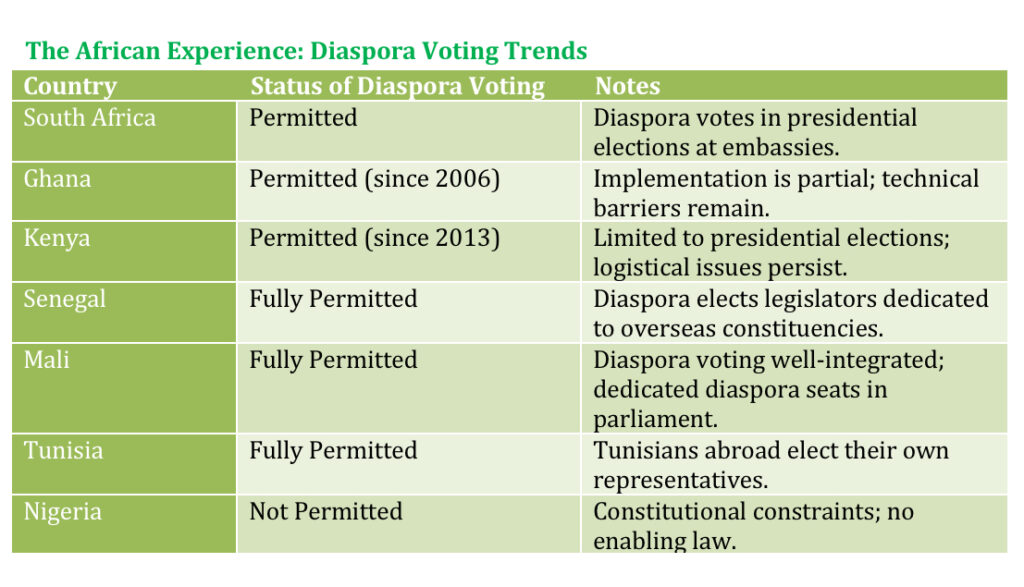
Executive Summary
Diaspora voting has gained considerable momentum worldwide. It is the right of citizens living outside their home country to take part in national elections. In Africa, while several countries have embraced diaspora enfranchisement, many, including Nigeria, stay either hesitant or stagnant. This background policy brief examines global and African trends in diaspora voting. It finds lessons Nigeria can learn. It also recommends a pathway for institutionalizing diaspora voting rights in Nigeria.
Introduction
The phenomenon of migration has expanded the footprint of national populations beyond territorial boundaries. It creates dynamic diasporas that influence politics, economics, and culture in their countries of origin. Recognizing their growing relevance, many nations have adopted diaspora voting to strengthen democratic participation and harness diaspora engagement. In Nigeria, constitutional and logistical barriers have hindered diaspora voting despite persistent advocacy. As the world moves toward more inclusive political systems, Nigeria risks marginalizing an important segment of its citizenry. An estimated 17 million Nigerians in the diaspora will be affected if reforms are not urgently prioritized.
Global Trends: Beyond Africa
Diaspora voting is more advanced globally than in Africa.
France: French citizens abroad have 11 dedicated seats in the National Assembly.
Italy: Italians abroad elect members of Parliament directly from overseas constituencies.
India: While India allows expatriates to vote, actual implementation is restrictive; physical presence at Indian polling stations is needed.
Mexico: Mexican citizens abroad can vote in presidential elections via mail and, recently, online.
United States: Americans living abroad can vote via absentee ballots for federal elections.
Key Insights Globally:
§ Most advanced democracies allow remote voting: absentee ballots, postal voting, online platforms.
§ Recognizing the diaspora’s economic power (e.g., remittances), many countries actively promote political inclusion as a bridge to investment and soft diplomacy.
The African Experience: Diaspora Voting Trends
| Country | Status of Diaspora Voting | Notes |
| South Africa | Permitted | Diaspora votes in presidential elections at embassies. |
| Ghana | Permitted (since 2006) | Implementation is partial; technical barriers remain. |
| Kenya | Permitted (since 2013) | Limited to presidential elections; logistical issues persist. |
| Senegal | Fully Permitted | Diaspora elects legislators dedicated to overseas constituencies. |
| Mali | Fully Permitted | Diaspora voting well-integrated; dedicated diaspora seats in parliament. |
| Tunisia | Fully Permitted | Tunisians abroad elect their own representatives. |
| Nigeria | Not Permitted | Constitutional constraints; no enabling law. |
“Key Insights from Africa:
§ Countries like Senegal and Mali not only allow diaspora voting but grant diaspora citizens dedicated legislative representation.
§ In most African nations that permit diaspora voting, it is often restricted to presidential elections due to logistical simplicity.
§ Implementation challenges remain (e.g., voter registration abroad, verification, cost management), but political will has consistently driven reforms.
Nigeria’s Position and Challenges
Nigeria is Africa’s largest economy and the continent’s biggest recipient of remittances, receiving $20 billion annually. Still, Nigeria lags behind peers in diaspora enfranchisement.
Key challenges include
§ Constitutional Restrictions: Nigeria’s 1999 Constitution does not offer for external voting.
§ Lack of Political Will: Successive governments have expressed support but have neglected to push legislation or constitutional amendments.
§ Institutional Readiness: INEC’s ability to conduct credible elections domestically raises concerns about expansion abroad.
§ Logistical Concerns: Cost implications, voter verification abroad, security, and diplomatic coordination are cited as barriers.
Recommendations for Nigeria
1. Constitutional Amendment: Urgently focus on an amendment to allow external voting for presidential elections initially.
2. Legislative Framework: Enact enabling laws specifying the scope, procedures, and institutions responsible for diaspora voting.
3. Pilot Programs: Test diaspora voting in select countries with significant Nigerian populations (e.g., USA, UK, South Africa, Canada) during the next general election cycle.
4. Capacity Building for INEC: Invest in training and digital tools. Collaborate with embassies to ease diaspora voter registration and balloting.
5. Public Awareness Campaigns: Build trust and demand through education targeting both diaspora citizens and domestic stakeholders.
Conclusion
Diaspora voting is no longer a luxury but a democratic imperative in a globalized world. Nigeria’s failure to enfranchise its diaspora community contradicts its aspirations for inclusive governance and development. Comparative experiences from Africa and beyond show that the political, logistical, and constitutional hurdles Nigeria faces are surmountable. Overcoming them requires political will and strategic planning. Now is the time to act!
The author, Collins Nweke, was Chairperson Emeritus of Nigerians in Diaspora Organisation (NIDO) Europe from 2011 to 2013. He is a Fellow of the Chartered Institute of Public Management of Nigeria. He is also a Distinguished Fellow of the International Association of Research Scholars & Administrators. He holds a PhD (honoris causa) in Governance.
